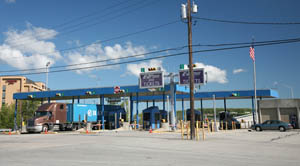White House Continues Support for Tolling to Finance Infrastructure Projects
 In the Economic Report of the President published last week, the White House echoed the Trump Administration’s preference for tolling as a means of generating funding for the highways. The report also went on to say that the administration believes that trucking isn’t paying high enough taxes to compensate for “the negative externalities [trucks] generate” regarding highway conditions, congestion and highway safety.
In the Economic Report of the President published last week, the White House echoed the Trump Administration’s preference for tolling as a means of generating funding for the highways. The report also went on to say that the administration believes that trucking isn’t paying high enough taxes to compensate for “the negative externalities [trucks] generate” regarding highway conditions, congestion and highway safety.
The annual report drafted by the White House’s Council of Economic Advisers focuses on gasoline and diesel taxes, which have served as the main means for funding the U.S. Highway Trust Fund for over 60 years. According to the report, fuel efficient vehicles “pay less than the marginal costs generated by their use of roads in terms of wear and tear, congestion and other external costs.” Fuel taxes also produce the same revenues for low-traffic rural roads as heavy traffic urban highways.
“Furthermore,” the document states, “evidence suggests that heavy trucks in particular do not currently faces taxes and charges that are aligned with the negative externalities they generate, which include pavement damage, traffic congestion, accident risk and emissions.”
The administration contends that tolls would “counteract” the shortcomings it believes are present in the fuel tax.
President Trump has emphasized private financing since his 2016 run, including tolling for supporting repairs and maintenance to the country’s transportation infrastructure. The administration’s recently released infrastructure plan outline promotes tolling as a viable source of funding in addition to state and local spending instead of federal funding. The plan would also eliminate the ban on interstate tolling.
Trucking organizations are opposed to Trump’s goal of increasing tolling for funding. The American Trucking Associations, which published a bulletin in January encouraging Congress to increase the per-gallon fuel taxes to preserve U.S. financing for roads and bridges, argues that tolling is “a road to nowhere.” ATA also stated that the trucking industry covers 45 percent of the HTF’s annual revenue through diesel taxes.
Chris Spear, ATA President and CEO stated, “Study after study shows the shortfalls of tolling and the unintended consequences that tolls impose on motorists and surrounding communities.”
The ATA is pushing for a 20 cent increase on gasoline and diesel taxes (5 cents per year over four years) to protect the solvency of the Highway Trust Fund. The last fuel tax increase occurred over 20 years ago in 1993. The flat tax rates at 18.4 cents a gallon for gasoline and 24.4 cents a gallon for diesel have grown insufficient as a result of inflation and a decrease in demand thanks to fuel efficient vehicles, shrinking the Highway Trust Fund’s revenue stream.
The Owner-Operator Independent Drivers Association also called for gasoline and diesel tax increases in January. “The heart of it is a fuel tax with revenues collected going to roads and bridges. It’s simple, efficient and it serves the very real needs of our country and its people,” stated Todd Spencer, president of OOIDA. “If elected officials think a fuel tax increase would be unpopular, wait until Americans encounter more and higher tolling.”
The Alliance for Toll-Free Interstates identifies tolls as “wildly inefficient.”
The Alliance stated earlier in February, “In addition to the diversion onto secondary roads which causes congestion and public safety issues, tolls will do unimaginable harm to businesses, as shipping and manufacturing prices skyrocket to account for these new costs.”
Click here to see See the Administration’s Economic Report of the President
Source:
ccjdigital.com


